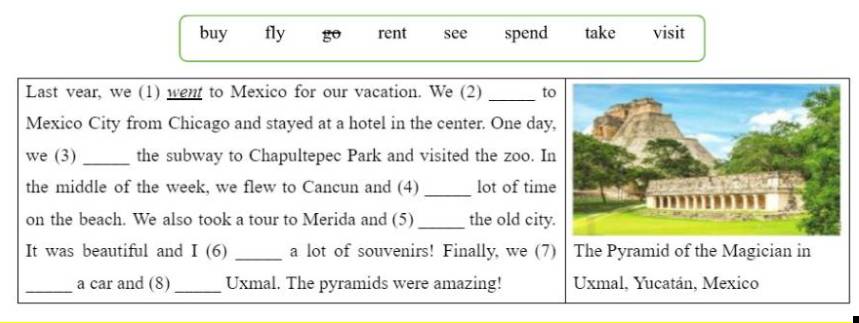Hãy nhập câu hỏi của bạn vào đây, nếu là tài khoản VIP, bạn sẽ được ưu tiên trả lời.

1. are owned
2. were sold
3. are often used
4. is usually answered
5. is accessed
6. are sent

1. arrived
2. closed
3. were sleeping
4. was taking off
5. saw
6. opened
7. read
8. put
9. picked up
10. went
11. was
12. was not raining
13. were walking
14. crossed
15. followed
16. didn’t know
17. were going
18. didn’t want
arrived - closed - were sleeping - was taking off - saw - opened - read - put - picked up - went - was - wasn't raining - were walking - crossed - followed - didn't know - were going - didn't want

E. In pairs, make sentences about a past vacation. Change the verbs into the simple past.
(Thực hành theo cặp, hãy viết câu về một kỳ nghỉ trong quá khứ. Thay đổi các động từ dùng thì quá khứ đơn.)
1. Last summer, / my family / go on / vacation. Last summer, my family went on vacation.
2. We / drive / all day. ____We drove all day___________________________________
3. In the evening, / we / arrive / at the campsite. ___________________In the evening, we arrived at the campsite____________________
4. Every day, / I / swim / in a lake / and / walk / in the forest. ________________Every day, I swam in a lake and walked in the forest_______________________
5. One day, / we / take / a tour of an old city. _________________One day, we took a tour of an old city______________________
6. We / be / very happy. ______We were very happy_________________________________
7. It / be / an amazing trip. ______It was an amazing trip_________________________________

1920 The first radio broadcast (1) was transmitted by KDKA in the USA.
1925 The first soap opera, The Smith Family, (2) was broadcast on the radio.
1928 A television image (3) was sent from England to the USA for the first time.
1928 The first television set (4) was sold.
1936 The first BBC TV programmes (5) were made in the UK.
1940 Colour TV sets (6) were demonstrated by CBS in New York.
1947 Baseball games (7) were televised for the first time.
1954 More money (8) was earned by TV broadcasters than by radio broadcasters.
1964 Colour TV sets (9) were bought by families across the USA.
1983 The final episode of the comedy series M*A*S*H (10) was watched by more than 125 million viewers.
1990 The first episode of The Simpsons (11) was shown on Fox.

1. was shining
2. were singing
3. was getting
4. was putting
5. were making
6. was talking

a. We use the second conditional to describe an unreal or imaginary situation and its result.
(Chúng ta dùng câu điều kiện loại 2 để mô tả những sự kiện không có thật hoặc tưởng tượng ra và kết quả của chúng.)
If shops didn't exist (imaginary situation), we would buy (result) everything online.
(Nếu các cửa hàng không tồn tại (tình huống tưởng tượng), chúng ta sẽ mua (kết quả) mọi thứ trên mạng.)
We use the (1) past simple in the if clause and we use (2) would + (3) infinite in the main clause.
(Chúng ta sử dụng thì quá khứ đơn trong mệnh đề if và dùng would + nguyên mẫu không to trong mệnh đề chính.)
b. We can put the main clause first. In this case, we don't need the comma.
(Ta có thể để mệnh đề chính lên trước. Trong trường hợp này, ta không cần dấu phẩy.)
I'd buy you a present if I had enough money.
(Tôi sẽ mua cho cậu một món quà nếu tôi có đủ tiền.)
c. We use could to mean would + be able to. It is also the past simple of can.
(Ta dùng could với nghĩa là would + be able to. Nó cũng là thể quá khứ đơn của can.)
If I won the lottery, I could stop work.
(Nếu tôi thắng xổ số, tôi có thể nghỉ việc.)
If she could speak English, she'd get a job in the USA.
(Nếu cô ấy có thể nói tiếng Anh, cô ấy có thể có việc ở Mỹ.)
The world would be much better if money didn’t exist.
If money didn’t exist, how would you buy things?
If you needed something, you would make it.
If you couldn’t make it, you would swap with somebody else.
So if I wanted a new mobile phone, how would I get it?
If money didn’t exist, life wouldn’t be better for poor people.
If nobody had any money, everybody would be equal.



Last year, we went to Mexico for our vacation. We flew to Mexico City from Chicago and stayed at a hotel in the center. One day, we took the subway to Chapultepec Park and visited the zoo. In the middle of the week, we flew to Cancun and spent lot of time on the beach. We also took a tour to Merida and saw the old city. It was beautiful and I bought a lot of souvenirs! Finally, we rented a car and visited Uxmal. The pyramids were amazing!